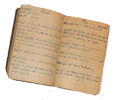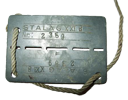Finckenstein 1943
January 1st 1943. I had my breakfast in bed (such as it was) and had a quiet day reading and thinking. I did a lot of that; thinking of home and what they were doing. Later, in the afternoon, we had a whist drive and in the evening, a dance. Earlier we had a piano accordion come from the Stalag, from the Red Cross. We formed a band which comprised of three singers, four mouth organs, one accordion (which I played), one knick knacks (spoons), one improvised trumpet and drums which were made out of different sized tins. We practised in the cookhouse in the evenings and it wasn’t a bad little band. At least it livened things up and we enjoyed it.
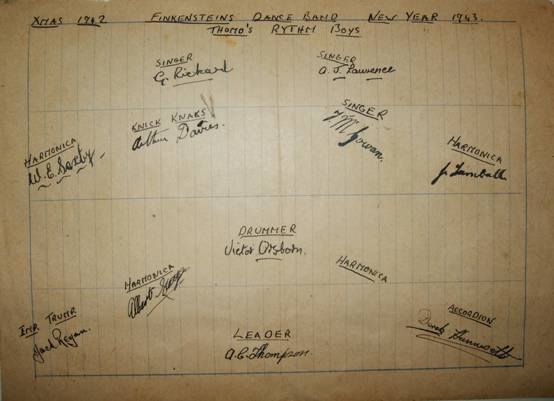
The dances went down well even though there were never any girls. It seemed strange dancing with men at first but it was better than nothing. In the beginning a lot of the men couldn’t dance so we organised dancing lessons and, having plenty of time, there was a lot of improvement. Another year was over and again we wondered when this was going to end. What wouldn’t I have given just to be able to go for a walk without any goons watching all the time? At Christmas time we seemed to be more vulnerable than at any other time. We would think of our loved ones at home and, as the years went by, we often thought whether we would ever see them again. Then we would think “Of course we will, this is only a bad dream, it has to end sometime!” and get stuck in with something to do and forget for a while.
We did a lot of threshing up to the 2nd of February. It wasn’t a bad job and was under cover in the barns. During that time, the Commandant had all the tins in the food parcels pricked with bayonets. This was, apparently, because a notice came around from the German High Command asking all British P.O.W.s if they would like to join the Free Liberation Army. Anyone joining would be free and have extra amenities. They would not be put at the front, with the fighting forces, but on non-combatant duties. As can be imagined there was one hell of an uproar and someone smeared the notice with excrement and stuck it on the Commandants door to show just what we thought of it. Needless to say nobody signed up for it but much later we heard that there were a few who did sign, amongst the prisoners in Germany, and that they had a bad time when hostilities ceased.
One day while we were using the conveyor to unload hay into the barn, Taffy decided to climb it as a short cut to the loft. We did it all the time but on this occasion he slipped and one of the spikes went into his stomach and he had to be taken to hospital. It was rather serious but he got over it alright and nobody climbed up that way again.
On the 3rd I went to Reisenburg to a sugar beet factory unloading Kalk (it was some sort of powder and very acid). It made my eyes very swollen and sore.
The next day I had to go sick but wasn’t allowed to stay indoors longer than one day. My eyes were very painful for several days after that and it took a week or more before I could get it off my clothes.
On the 5th when we were at the Schloss for our orders, I and seven others were picked to go with five civilians to work in the forest. We collected an axe each, some wooden wedges and five crosscut saws. We climbed aboard a sleigh that was pulled by two horses and after about an hour arrived at a point deep in the forest. One civilian (we called him Snuffy because of his habit of taking snuff in very big doses) told me to go with him. First he would look around, select a tree and see which way he wanted it to fall. Then we would cut a vee shaped notch on one side of the trunk with the axes and get down on one knee and use the crosscut saw, one on each side, one pushing and one pulling alternately. I thought that it was the previous year all over again and my arms felt as if they would drop off. Snuffy was better than Odd Socks at Lebanau though and we did have a breather every now and again. When we stopped we hammered wedges in behind the saw, in the cut. When we were nearly through, and the wedges hammered in further, it would start to topple and with shouts of “Achtung Achtung” it would come crashing down. We then trimmed all the branches off and cut the trunk into twelve foot lengths and stacked them into piles. It was hard work, and in thick snow as well, but I preferred it to being on the farm. It was a lot better than the previous year. They were a better bunch of civilians and didn’t keep chasing you, letting you have a breather every so often. We would work flat out until about 12:30 pm, build a large bonfire to keep warm and have our dinner which was brought out on another sleigh. We got more food too but we needed it and the work certainly gave you an appetite. We then sat around the fire until it was time to go back. We spent some of the time sharpening our axes and saws but the afternoon was very peaceful and easy sitting around that big fire.
That was the first time that I had ridden on a sleigh. It was very quiet with just the swish of the runners and the tinkling of the bells that were always on them. Every now and then there would be a crashing nearby as a deer or wild boar took flight through the trees. It was always fir trees that we felled and they were used for fuel for the civilians during the winter. That job lasted until the beginning of March.
On Tuesday the 9th of March I had a go at driving Oxen, collecting tins, stones and wood around the village. In the end I think I was more exhausted than the Oxen because no matter how much I shouted and belted them they just plodded on at their own pace or stopped altogether. I had only one day with them, which was enough for me. I was glad that I wasn’t picked to work with them any more. I had another couple of days with Karl, which resulted in more eggs and an easy time. He told me that he was leaving soon to go in the Army. He wasn’t looking forward to it and didn’t have a good word for Hitler. If ever, during his time in the Army, he should happen to be amongst any English they would be surprised at his attempt at speaking our language. What he had picked up from us had a swear word every other word and it was amusing listening to him trying to speak it.
During March and April we had various jobs. At one time I worked in the gardens of the Schloss and that was the best job of all. It was quite easy and no one bothered us. We were raking the gravel paths, tending the lawns, flowerbeds and transplanting in the greenhouse etc. Everybody tried to get in there if they could. It was so much different out on the farm and by now my hands were hard as rocks. We did a lot of dung loading and wood chopping for the civilians at their cottages. On that job, if the women were alright, you might get a cup of coffee or a piece of bread and cheese (or bacon) to eat while you were there. If you were very lucky you might get something to eat and drink and also be able to swap a bar of chocolate or soap for something. If you weren’t lucky all you would get was a mouthful of abuse and black looks. If looks could kill we would have died on the spot. Every cottage had chickens running in and out, with pigs running loose in the yard.
On the 12th of May we started singling out sugar beet and turnips. On Monday the 17th there was a lot of trouble. The guards that were in post now were a bunch of *!*****!, particularly one who is very trigger happy and we call the bandit. We could never work fast or well enough for them. Any one needing to leave the field for toilet purposes would naturally fall behind and would be chased unmercifully until he caught up. When anyone wanted to leave the field, he first had to ask the guard and then walk back until the guard shouted “Halten sie dar!” (Halt stay there!). He then did what he had to do and then came back. It was only about thirty to forty yards away and it was the same for the women who were with us. On the 25th there was still trouble with the guards. Jack had to leave the field and while he was gone, I was doing his row as well as mine so that he wouldn’t fall behind. The guard came up and saw what I was doing and shouted “Halten sie dar lassen sie du schwine hund!!” (Stop there leave them you pig dog!!). I did until he was gone but just as Jack was coming back the guard spotted me doing it again (he was the bandit). He came running up shouting and unslinging his rifle. I stood up and he started shooting at my feet. I just stood there watching him. I wasn’t being brave, or anything like that, but we had got to the situation where we couldn’t care less. Every one of our boys got up and faced him as well and whether he got cold feet or not, I don’t know, but after a lot more shouting he walked away. We went back to work and it wasn’t until later that I realised it could have been very nasty for me as the shots were very close to my feet. I’m afraid I was shaking for a while but I don’t think I have ever hated anyone so much in my life. When we got back that night the Bandit had me in front of the Commandant who said I was to be put in the cooler for two days when the singling had finished. Two days later on the 27th we did finish and I was glad to see the end as it had been particularly bad this time. I then served my two days and nights in the cooler and it was a change even if not a comfortable one. It was very cold and dark again and the floor was very hard. There was a lot of scuffling going on with the rats but they didn’t come near me, although they were too close for comfort.
From then on it was dung loading, hoeing and various jobs to be done on the farm. One day I was given a horse and plough and was supposed to ridge the potatoes up. I thought that it would be easy with only one horse to look after. When I got to the field, off I went but had only gone about fifty feet when there was an almighty shout and when I looked back there were potatoes all over the place. I had managed to dig them up instead of ridging them. They took me off that job (I wonder why?). They said it was sabotage but it caused a laugh amongst our lads and it was a long time before they let me forget it.
During haymaking we did a lot of scything, which I had never done before. Only about six of us stayed on this job and I got on very well with it. We then loaded the hay on to the wagons. I was shown how to load it properly by one of the civilians for one day and then left on my own with a German girl. If the wagons weren’t loaded in a certain way, when it came to unloading them, they could be in a right tangle. The girl who was with me was young and named Lena. I was with her a lot on the hay wagons and got on well with her. It was quite funny when the wagons were fully loaded because we used to slide down the sides to the ground. When the girls slid down everyone would watch as one or two never had anything on under their skirts! Our eyes nearly popped out but they never took a blind bit of notice. They were all German girls.
We were still doing fairly well with the Red Cross parcels and received quite a few clothing and cigarette parcels. I was mucking out with a chap named Phil now and although Jack was back from hospital, he wasn’t in the same room. Phil hardly ever had a letter from home and no clothing parcels, so I used to share mine with him. He was from Birmingham. I asked my mum to send out my football boots, which she did, and I gave them to him. He was as pleased as punch with them. He was mad about football and a very good player. I didn’t play much but we used to have a game some Sundays in a field nearby, watched by the civilians and guards.
We had our photograph taken outside our billet. We had been promised to have it done for several months but we never thought it would happen. One was all the camp in a group and the other one of our room. They weren’t that good though. We had a lot of dances and, although I was still playing in the band, it wasn’t quite as much, as Vic was learning to play and we would take it in turns. Johnny Morris had a bass come from the Stalag; he had been in the Army as a musician since he was a boy. There was a chap in the other room called Kit Small who had a lovely voice and we used to get him to sing one of our favourite songs, “Begin the Beguine”. (Every time I hear that now, I can see him standing there singing it.) Sometimes on a fine night, on a Saturday or Sunday, we would sit outside and play as a band and there would be a lot of civilians sitting outside the wire listening to us. I suppose it made a change for them as there wasn’t a lot for them to do there. If we happened to play a tune they knew, like “Lillie Marlene” they would join in singing.
In August it was blazing sunshine and we were brown as berries having been out in the fields all day long, wearing just a pair of trousers. We were binding and scything wheat and I had two lovely days. I was scything the corners and bad spots in one corner of the field so that the harvester could get round easier. The harvester was pulled by two horses and it took about half an hour for it to do a circuit before it came next. It only took me about five to ten minutes to scythe and I had Lena with me (no guard or anyone else near us) to bundle up the wheat that I had cut. We would do it as quickly as we could and then go and sit in the corn for the rest of the time. She was a very nice girl and would ask me a lot of questions about what it was like in England, as her boyfriend was a P.O.W. there. I was able to speak a little German by now and, with a little bit of sign language as well, we got on fine. I could have done with a lot more days like that.
On the 1st September we were marched to the Schloss in the morning for orders and I was picked out by Snuffy to work in the gardens with four others, who were regulars. I don’t know why he picked me, unless it was because of something that happened while we were harvesting. We had been bundling the wheat behind the civilians, who were scything, when Snuffy left the field for a few moments. While he was gone I picked up his scythe and thought I would have a go. When he came back he said I was doing fine and bundled up after me for a time. (I got my leg pulled at that, for having a German working under me.) I was given a scythe regularly after that. I had also worked with him in the forest.
On the first day in the garden we planted nine thousand pansies. It was a lot easier here. There were no guards with us, only about three German civilians (men) and some Polish and German girls. One day we had been working near the tomato beds (there were hundreds of plants) and it was getting near finishing time. While one watched, to make sure nobody was coming, the rest of us went between the rows and stuffed our trouser legs with tomatoes. The gaiters stopped them coming out at the bottom but, just as we reached our billet, one of my gaiters came adrift and out started to come the tomatoes. The guard at the gate happened to be looking elsewhere and I managed to grab the tomatoes, do up my gaiter and get inside without the guard seeing what had happened – I was lucky! I have an entry in my diary that says there was a big row in the garden and that we were sent out but what it was about, I can’t remember. I should think it was something we were trying to pinch because, if only one of us were involved, only one would have got into trouble. That finished me in the garden for that year, which was a pity as it was a very cushy number.
On the 6th of October we were detailed to turnip pulling. The area we were told to do stretched into the distance and it was just impossible to complete before we finished for the day. As a result we all went slower, which caused a hell of a row with lots of shouting and shots being fired over our heads. We didn’t go any faster but just plodded on at a steady pace, whilst keeping a wary eye on the guards. We didn’t get anywhere near finishing the area they wanted us to even though we were kept out until it was getting dark. The next day they reduced the area but it was still too big to suit us, so again we went slowly and the same trouble ensued. The following day it was reduced again and now we were satisfied and worked normally. It was just as well the Bandit wasn’t there or it might have been a lot worse. Another day we were coming back to the billet after being at the potato clamp all day. There were about ten of us and we were marching along behind one of the guards we called Loony. (He gave the impression he was a bit that way.) He seemed very meek, used to break out singing opera and was always chuckling to himself. We kept crowding him, trying to make him walk back faster, when suddenly he turned and swung his rifle around his head, missing those near him by inches. I don’t know who was most surprised, him or us, as he started to chuckle self-consciously. He had never given us any trouble before when we took the mickey out of him but he still wouldn’t go any faster. He was only a little chap so perhaps he couldn’t!
We heard that Marienburg had been bombed on the Saturday and some of our boys had been killed along with big Lisa, a German girl from the village. We would hear lots of rumours including that Russia was at war with Germany. We hoped it was true and that they would make a big push because we knew we weren’t far from the Russian border. It gave us hope that we might be home by the next year.
Dick, the medical orderly had gone back to the Stalag and we were told that he had gone back to Blighty looking after the very sick and wounded, who were repatriated. How we wished it was us. (When Dick did arrive home he wrote to my Mother – I bet she was pleased to hear from him.)
Some of us were given the job of spraying the fields with, what I think was called, Kunisdung. It was some sort of fertilizer that had to be spread by hand whilst walking along. We carried it in a sack slung around our shoulders and was spread with one hand in a sweeping motion. We walked for miles and at the start the sacks were very heavy, so when nobody was looking we would spill a lot of it out, finishing up with a long way to go with nothing left in the sack but going through the motions with our hand. It made our eyes very sore and, if it happened to rain, we had to pack up. Not before it got soggy though. It was one hell of a job to get it off of our clothes.
For most of October, and until the 20th of November, we were pulling sugar beet, loading it on a trailer and taking it to Reisenburg. One day the trailer got stuck in the snow and, try as hard as we might, we just couldn’t get it out. The Commandant was there and started shouting at us. Phil lost his temper and handed him a shovel and told him to have a go. He had a go alright and beat Phil up with his rifle butt.
When we took the trailer, it was pulled by a wood burning vehicle. (I don’t know what it was called and it just had a small cab with room for the driver and the guard. We would sit outside, behind the cab, and in front of the trailer.) There were usually three of us on it. On one trip, the guard must have been feeling dry, and we stopped at a Shenke (a small inn) and he said we could go in with him for a drink. That was the only time I went in one and when we walked in there were a couple of civilians in there. They gave us a look that was more surprised than hostile. It was nice to stand there having a drink and the owner was very friendly too. We stayed in there for about half an hour.
In December we were threshing for most of the time. They wanted another man to drive a wagon, so I volunteered. There were two horses to a wagon and I had a bit more idea this time and managed a lot better. At least I was better until they started trotting downhill. There was a gate at the bottom and I was bouncing up and down so much that my hat fell off. How I went through the gate I shall never know and it was a good job no one saw me or I might have been taken off that, as well. I did, eventually, get the hang of it and got on alright. It was a lot better than threshing and I only had to drive the wagon as it was loaded and unloaded for me, while I went out of the way for a smoke. I also managed to pinch some wheat and get it back to the billet, to make flour, to make cakes.
On Thursday the 16th of December we were told that we were going on a hare hunt. We thought it would make a change, and be good fun, but were soon disillusioned. It was a terrible day. All of us, P.O.W.s and civilians alike, had to walk for miles and all converge on one spot, shouting and banging sticks, driving the hares to where all the big nobs were. We didn’t see a thing, it took all day and we were worn out by the end of it.
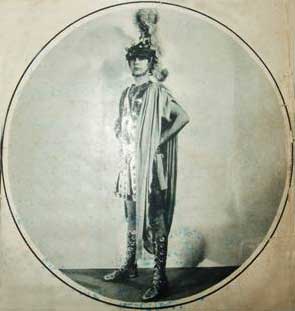
for the dance from this picture
During our time off I was busy making a fancy dress outfit for Phil for Christmas. We planned to have a fancy dress dance. It was to be the uniform of a Roman soldier and I made it out of bits and pieces that I was able to scrounge including old shirts and cardboard etc. The white binding string, when cut short and teased out, went all fluffy and it was just right for the crest on the helmet, which was made of cardboard and cloth. I also made a woman’s dress for myself, made out of old material that I could get! I managed to borrow a pair of stockings from Lena. It was funny trying to tell her what I wanted and what for. With my limited German (that didn’t really cover the subject) and a lot of pointing and demonstrating, she finally understood and I didn’t think she would stop laughing. It cost me three bars of chocolate and three bars of soap, though, before she would let me have them, and the promise that she would get them back. I was lucky in getting to work with her for a couple of days, sorting out potatoes on a machine. If anyone saw me trying to explain, to her, what I wanted they would have wondered what the hell I was up to. She must have wondered too, at first, as it must have looked very suggestive.
On Christmas Eve we had a Christmas Red Cross parcel for each man and I had two hundred fags from my Regiment. We all put two tins into the cookhouse where the cook made a lovely Christmas dinner, finished off with Christmas pudding and custard. We had it all together in our room. It was a great success and it was the best dinner I had had since I left home. We had the fancy dress dance in our room and it was won jointly by Phil and Jimmy Briscoe, so I was pleased about that. The dance finished at 1:30 am and the inner doors were kept open all night so that we could go into the other room as well. The day turned out better than we thought it would, considering the circumstances, but it very nearly didn’t. One chap made a break for it after the guards locked the outer doors and they didn’t hold their usual roll call. It was a spur of the moment thing when he found himself locked out. It was a bit stupid really as he had no coat on or any food with him. He was caught just outside the village and was brought back and put in the cooler. The Commandant went mad and threatened to stop all activities, but he eventually said that it wasn’t our fault and it was Christmas so we could carry on. The guards, however, really got it in the neck for not doing their checks properly. We could hear him ranting at them, which pleased us enormously.
On Boxing Day we had a whist drive in the afternoon and a dance in the evening. It was a very successful Christmas and everybody mucked in and tried to forget things for a while. I wasn’t easy though and it was noticeable that men would suddenly creep to their bunk and read a letter or look at photos from home with a faraway look in their eyes. We all did it at some time or other and it was best to just leave them alone for a while.
On New Years Eve we were threshing during the day but in the evening we had a masked ball! It ran from 9:30 pm to 5:00 am and the Scotsmen came into their own, going wild. I also dressed up as a woman as Vic was playing the accordion over the New Year.
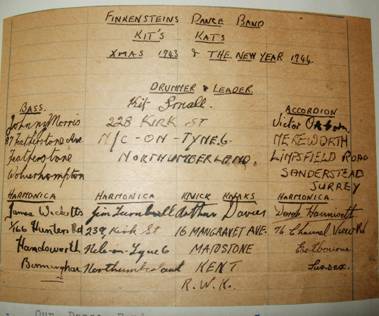
(The best band we had)
(Vic and I took turns on the accordion)
